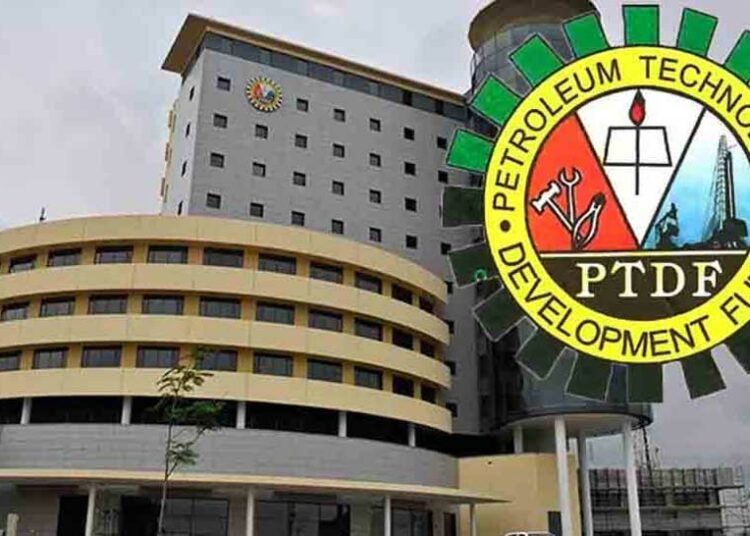The Petroleum Technology Development Fund (PTDF) has said it is losing its human capital investment to the United Kingdom, United States and Canada.
The PTDF is an agency under the Ministry of Petroleum Resources saddled with the responsibility of developing capacity for the oil and gas industry.
Head of the Overseas Scholarship Scheme (OSS), PTDF, Bolanle Kehinde-Agboola, said 8,196 Nigerians had so far benefited from the combined Overseas and In-Country Scholarship Schemes of the Fund.
She however lamented that most of the students sent abroad had been retained in the United States, the United Kingdom and Canada due to lack of employment in oil and gas companies in Nigeria.
Speaking on Thursday in a keynote address tagged, “The Role and Impact of PTDF on Nigerian Students/Youths and our Institutions” at a one-day PTDF students sensitisation/capacity building programme in Uyo, Akwa Ibom State, Kehinde-Agboola revealed that the agency had commenced collaborations with oil and gas industries in Nigeria.
She stated that the aim is to ensure that students, especially those trained through its scholarship scheme outside the country, are employed in key positions in the companies.
“The PTDF is designed to meet the long-term human capability requirements of the oil and gas industry through education and training of Nigerians (in-country and overseas) in relevant fields such as: engineering, geological sciences, environmental studies, management, ICT, and health and safety.
“Total beneficiaries from the combined recipients of Overseas and In-Country Scholarship Schemes are 8,196. We have trained over 8,000 students and some of them after the training remain over there. All our investments are retained in US, UK, Canada, and more.
“Also, there is a complaint that when they come back to Nigeria, they don’t get a job, and they are finding it difficult to be absorbed in the oil and gas industry. Therefore, we need to create more cooperation and partnership with the oil and gas industry,” she stated.
Kehinde-Agboola explained that the programme was established by Act No. 25 of 1973, which replaced the Gulf Oil Company Training Fund Administration Act, 1964.
She said the PTDF inherited all assets and responsibilities from the defunct Gulf Oil Company Training Fund, adding that it was created to provide training and education for Nigerians in the petroleum industry.
She explained that the scheme absorbed those who have SSCE with five credits, including English and Mathematics, and it is open to graduates with second class upper or second class lower, with industry experience, pursuing master’s degree. She added that the scheme sponsored research across universities in the country.
“We are here today to sensitise the students of the University of Uyo to the activities of the PTDF. It is a government agency under the Ministry of Petroleum Resources to discharge the responsibilities of developing capacity for the oil and gas industry.
“The PTDF does this in three ways: One is research and development; we have institutional capacity building, city building, and human capital development. Under human capital development, we have programmes that the PTDF has developed. One of them is the PTDF scholarship in which most of the students are interested.
“The purpose of that scholarship is to develop students in oil and gas-related areas to ensure that they have knowledge transfer from different institutions across the world.
“We also have to harness our alumni, we have a lot of them scattered all over the world. How do we harness them for our own benefit and also improve recruitment and number of scholars of our product in the oil and gas industry? This is the major problem for us,” she noted.
Sunday Adedayo Asefon, Senior Special Assistant on Students’ Engagement to President Bola Ahmed Tinubu, said what students needed was access to knowledge, mentorship, and opportunities.
Asefon noted that the oil and gas sector was no longer a space for only technical experts; it demanded a multi-disciplinary approach, involving engineers, policy analysts, digital innovators, environmental scientists, legal minds, and even community mobilisers.
He said the youth and students must be equipped with the tools not only to participate in the space but to innovate within it.
“The role of the PTDF in supporting capacity building cannot be overstated. Through initiatives like scholarships, training programmes, and partnerships with academic institutions, the PTDF is helping to lay the foundation for a new generation of Nigerian professionals who will bring excellence, transparency, and sustainability to this sector and Nigeria at large,” he said.
In their reactions, students of tertiary institutions in Akwa Ibom State praised the PTDF for designing programmes that meet the long-term human capacity in the oil and gas industry.
The programmes include education and training of Nigerians (in-country and overseas) in relevant fields like engineering, geological sciences, environmental studies, management, ICT, and health and safety.





